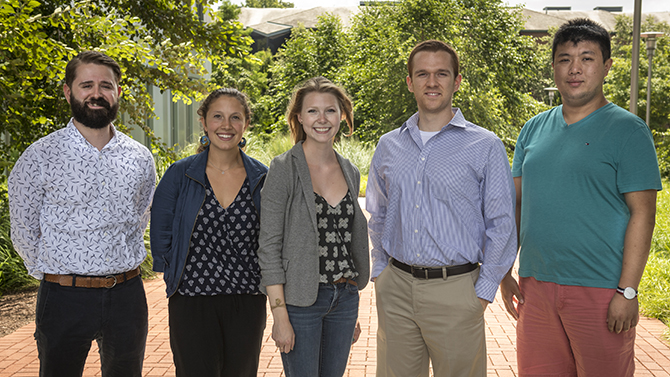


DENIN Fellows
Photo by Kathy F. Atkinson August 11, 2016
DENIN announces new cohort of doctoral fellowship recipients
The Delaware Environmental Institute (DENIN) has announced its third class of DENIN Environmental Fellows. The program supports doctoral students whose research interests demonstrate a clear bridge between science and society.
Five recipients were chosen following a rigorous selection process that included a written research proposal and an interview with finalists. In addition to the intellectual merit of their research proposals, candidates were expected to demonstrate a commitment to communicating and transferring the benefits of their research to the wider world.
“We are humbled by the exceptional talent and commitment to the environment among DENIN Fellows,” said Jeanette Miller, DENIN associate director. “For the next two years, they are part of the face of DENIN, and over the course of their lives, will be significant leaders.”
The 2016 DENIN Environmental Fellows are supported in part through the generosity of private donors who have supported two named fellowships. The fellowships are also supported by the Unidel Foundation and the National Science Foundation through the Delaware Experimental Program to Stimulate Competitive Research (EPSCoR).
The DENIN Fellows for 2016-18 include the following students:
Julia Guimond is the recipient of the Carski Family Fellowship in Water Quality. She received her bachelor’s degree in geology-biology from Brown University. After working for New Hampshire’s Department of Environmental Services Watershed Bureau for two years, she came to UD to study coastal hydrogeology.
Working with associate professor Holly Michael in the Department of Geological Sciences, Guimond will study how the movement of water through a salt marsh impacts marsh biogeochemistry and the fluxes of carbon between marshes and tidal creeks and estuaries. She is particularly interested in developing a numerical model that can predict how sea level rise and climate change will affect coastal salt marsh ecosystems.
Tyler Sowers is the Donald L. and Joy G. Sparks Fellow in Soil Science. He completed his bachelor’s and master’s degrees in soil biogeochemistry at North Carolina State University.
He will be working with Donald Sparks, Unidel S. Hallock du Pont Chair in Soil and Environmental Chemistry, in the Department of Plant and Soil Sciences to investigate mineral processes controlling the stability of soil organic matter under changing climatic and local environmental conditions. Soil organic matter is the largest terrestrial sink, or storage pool, of carbon, and instability of the organic matter may lead to release of its stored carbon to the atmosphere and thus contribute to climate change.
The first Unidel Biogeosciences Fellowship was awarded to Gretchen Dykes. She earned her bachelor’s degree from St. John Fisher College in Rochester, New York, and is working with assistant professor Angelia Seyfferth in the Department of Plant and Soil Sciences.
Her work will focus on the microbial communities of rice paddies and the potential of silicon-rich soil amendments that interact with soil microbes to prevent arsenic uptake by rice plants. Arsenic contamination in rice is a significant human health risk is many areas of the world where rice is a dietary staple.
Lingxiao Yan received his bachelor’s degree in marine science from Xiamen University in China and his master’s degree in environmental management from Duke University. He is working with professors Sunny Jardine and George Parsons in the School of Marine Science and Policy to apply the theory of ecosystem-based management to marine fisheries. This is a departure from traditional fisheries management, which has largely examined each species in isolation from other species occupying the same environment.
Yan will be working to develop models of fishery management that incorporate multiple species, thus improving the sustainability and economic performance of fisheries while reducing risk for fishermen.
Sean Ellis received his bachelor’s degree from La Salle University and his master’s in economics and applied econometrics from the University of Delaware. He is pursuing his doctorate in economics with Kent Messer, the Unidel Howard Cosgrove Chair in Environment, focusing on factors that shape and influence consumers’ perceptions of risk with respect to water quality. He is investigating consumers’ willingness to accept and pay for food grown with recycled wastewater, a frequently proposed measure to secure sustainable and cost-effective food production in the future.
More information about the DENIN Environmental Fellows program is available on the program webpage, including application information, video profiles of past recipients and information for prospective donors who wish to support the program.
About DENIN
The Delaware Environmental Institute (DENIN), founded at the University of Delaware in 2009, is an interdisciplinary incubator of research, knowledge and solutions specifically dedicated to safeguarding the environment and addressing environmental issues.
DENIN provides academic, government and industrial partners broad access to experts from multiple disciplines in a collaborative effort to advance environmental science, promote environmental education and devise innovative, multidimensional strategies for environmental sustainability.
Contact Us
Have a UDaily story idea?
Contact us at ocm@udel.edu
Members of the press
Contact us at 302-831-NEWS or visit the Media Relations website

